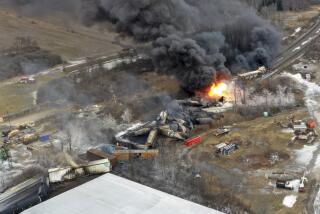U.S. Nuclear Missile Shield
- Share via
* Rep. Ellen Tauscher’s March 27 commentary, “Delay Decision on Nuclear Missile Shield,” is fundamentally on the mark--the U.S. is neither technically nor politically ready to consider deploying a national missile defense. But she misconstrues at least one key issue.
Tauscher argues that the planned NMD system would be “relatively useless if we were to face an all-out attack from . . . China.” China currently has an estimated 20 long-range missiles capable of reaching the U.S. Even if it were only marginally effective, the planned system would still have a very good chance of defending against a Chinese attack. That is one of the problems with the system--while the administration argues that it is not intended to negate the Chinese deterrent, Chinese military planners have to assume that it will. A deployed U.S. NMD will probably cause China to accelerate its development and deployment of nuclear-armed missiles capable of striking the U.S. A more aggressive Chinese nuclear posture is likely to have two critical effects: It will directly decrease the security of the U.S. and its allies, and it may well spark an Asian arms race that could threaten global stability and security.
The U.S. can continue to develop and test national missile defense systems (if such efforts are considered cost-effective and in the national security interest), but should not consider deployment until those systems have proved absolutely reliable in many successive tests. With one successful and one failed intercept test, the system currently under development is far from meeting that standard. President Clinton should indefinitely delay his deployment decision, currently scheduled for fall, until the technology has matured.
PHILIPP C. BLEEK
Herbert Scoville Jr. Peace Fellow
Washington
CHARLES D. FERGUSON
Director of Nuclear Policy
Federation of American Scientists
Washington
More to Read
Get the L.A. Times Politics newsletter
Deeply reported insights into legislation, politics and policy from Sacramento, Washington and beyond. In your inbox twice per week.
You may occasionally receive promotional content from the Los Angeles Times.










